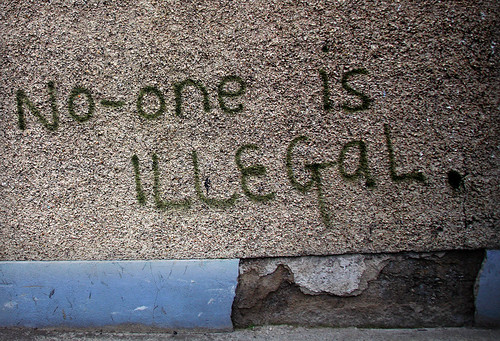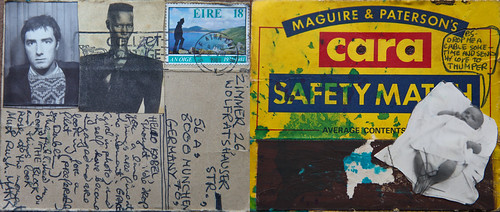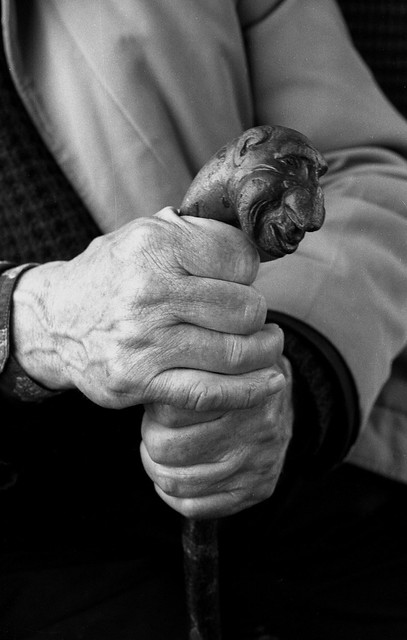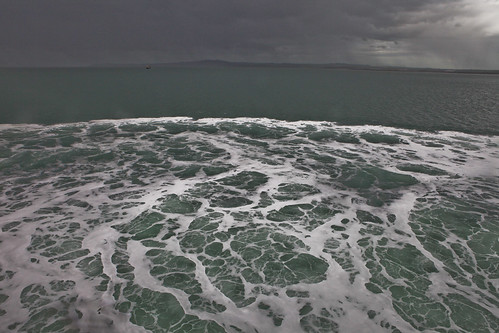No. Try Again
Testing, testing.
Pram
Out on the street, from my new perch in a stroller, I envy
the baby passing in its big shiny
black box: elevated, properly laid back, eye to eye with the ceiling.
Roadworks
Something is lying at the bottom of the trench they’ve dug,
a mustard-yellow tin bus: a toy. I ask my mother to ask and one of the men
kindly hands it to me: a single-decker, slightly muddy, the passengers’
profiles painted in each blue window.
Dream
I am being searched for again
by my mother’s empty red dressing gown (its neck slightly pointed from hanging
on the hook behind her door). It’s a game of hide and seek I am bound to lose.
When it finds me, all it will do is touch me with the poker it holds in one of
its handless hands –– the same one we use to poke the fire. A jolt of
heart-revving terror, and down I’ll go, sucked in, quickly digested and spat
out by that gawping rabbit hole tucked under the bed.
Myth 1
She told me she once set me loose on a beach to see how far
out I’d toddle out if left unhindered. And how far did I get –– the waist? the
chest? the brightly haloed, stubbornly unbobbing head? –– before she had to
shout, stand and run?
Burning Bright
My oldest stuffed toy is a squatting, round-faced tiger. Mended
countless times, fur a dirty orange, stripes long gone, straw (or wood
shavings?) poking out of its stumpy paws. It wasn’t called Tiger, nor Pooh’s
friend, Tigger, but that proto-word I couldn’t quite pronounce, that became its
proper name: I-ah.
Magic Dragons
To recall nothing but recent, grown-up clouds, lightshows
that have barely passed. Where are those first ones, puffs of silent cannon
exploding on my retina? What our child kept punching his finger at as I wheeled
his pram through the park.
Myth 2
In our grand guesthouse-hotel in
Bournemouth I went missing again, hiding and seeking. She said she panicked
because the maids were cleaning and airing the rooms, stripping beds, leaving
windows open. Memory-blank’s filmmaker screens it perfectly: a fresh breeze,
room after empty room of billowing white gauze.
Knowledge
When the boy in front of me rose from his desk a piece of
paper floated to the floor. A drawing he’d been working on, the baggy outline
(a crude horse) filled in carelessly, or painstakingly, with thin,
multicoloured candy-stripes. A pyjama-pantomime creature, yet somehow clearly,
startlingly, a horse. I rescued it from the floor and told no one: my
blueprint.
Myth 3
‘I’m not a gentleman. I’m a cowboy!’
Snow Globe
Looked forward to even more than the
summer’s infinite stretch, Christmas was special, something we could get the
measure of, flickering there at the bottom of a darkening dampening old year.
The religious part was rarely solemn, more a shadow-play, bright, animated
frieze, soundtrack of tinkling silence. Somewhere in that backdrop (though near
as the bedroom wall) familiar figures trod to their familiar-exotic
destination, bearing lovely aromatic words: gold, frankincense, myrrh. A god
like a pink baby was buried in all the sumptuous drapery. And a big star held
everything together like a great safety pin. The presents, though vital, were
more about bedding down, lining the floor of the cave with leaves, straw,
cotton-wool snow. In the corner of the living room, a pine smell, softly
prickling, a back door to the woods. Postponing then falling asleep was
deliciously sensual, knowing that when you woke your feet would nudge that
precious weight laid on the counterpane: at the foot of the bed, a rustle of
wrapping paper, a new red ball like an unhatched egg.
Clues
From
her family holiday, a girl who lived on my road brought back a remarkable gift:
a big jar of baby Natterjack Toads. Along each pebbly back ran a thin yellow
line, a seam of the purest gold. I hadn’t a clue. They died. Years later, she
became my first girlfriend. I hadn’t a clue. We kissed just once, pressing
together our closed mouths, lips dry with excitement.
Hotels
They
were always pleasantly new even when they were old. The little one my mother
took me to in Dungarvin, on a weekend break, a too-short holiday from nearby
Ring College where I was boarding. Narrow, thick-carpeted stairs. Smells of
fresh gravy and polish. The miniature bar of unwrapped, sea-green soap. I
wanted to stay there forever.
The Leather Boys
Our first, certified-over-16 film was a disappointment. Not
so much as a flicker of nude skin (let alone breasts): sulky faces, Brylcreem
and biker jackets. As tame as my inability to shift my fifteen-year-old arm
from the rim of her seat.
Blackout
Grandfather’s room was next to
mine. The plasterboard wall provided poor soundproofing. He always hated my insistence
on not settling down for the night, whether it was reading late or whispering
with my younger cousin who often stayed over. I’d try to switch off the bedside
light as soon as his bed-springs creaked and he rose to make his way to the
bathroom. But I was often too slow, or he was too quiet, and he’d spy the telltale
yellow leaking around the edges of my door. Each room had a key and one night
when my cousin was staying I dared to lock the door. In a fury at my defiance,
grandfather whacked at the door with one of his golf clubs. My cousin was shocked. We all were: thunderclaps of actual violence. I can’t remember whether
I gave in and opened the door or my mother or grandmother talked him to bed. Some time after
this, I tore off and sellotaped strips of paper around the edges of my door,
blacking out that unholy rectangle.
The Moth
My first story was called The Moth, about a boy who is
frightened to death and turns into a moth, battering at his own window.
Preparation for a lifetime’s work, a thesis in nocturnal daydreaming.









